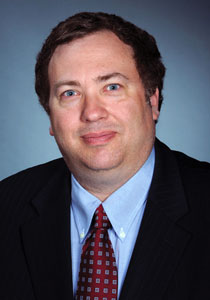 Anytime you hear or read a news report of any kind — newspaper, radio or television, or Internet — it’s likely at least one Middle Eastern country will be mentioned. So David Makovsky knows that when he comes to Kansas City next week on Wednesday, April 13, people will want to know what the turmoil in the Middle East means for Israel. He’ll discuss that and the future of the Israeli-Egyptian peace treaty in a presentation titled, “After Egypt: Looking at Prospects of Mideast Peace,” at 7:30 p.m. at the White Theatre at the Jewish Community Campus. The event is free and sponsored by Jewish Community Center, Jewish Community Relations Bureau|American Jewish Committee and Jewish Federation of Greater Kansas City.
Anytime you hear or read a news report of any kind — newspaper, radio or television, or Internet — it’s likely at least one Middle Eastern country will be mentioned. So David Makovsky knows that when he comes to Kansas City next week on Wednesday, April 13, people will want to know what the turmoil in the Middle East means for Israel. He’ll discuss that and the future of the Israeli-Egyptian peace treaty in a presentation titled, “After Egypt: Looking at Prospects of Mideast Peace,” at 7:30 p.m. at the White Theatre at the Jewish Community Campus. The event is free and sponsored by Jewish Community Center, Jewish Community Relations Bureau|American Jewish Committee and Jewish Federation of Greater Kansas City.
Makovsky said that with all the current turmoil in the Mideast, “people are hopeful and watchful.”
“Israel wants more democracies in the Mideast but is that going to be a turbulent process? They don’t know what it will mean in the short term or the long term,” he said.
Makovsky is currently the Ziegler distinguished fellow and director of The Washington Institute for Near East Policy’s Project on the Middle East Peace Process. The Washington Institute is an independent, nonpartisan research institution generating analysis and recommendations that advance a balanced and realistic understanding of U.S. interests in the Middle East.
Makovsky is also an adjunct lecturer in Middle Eastern studies at Johns Hopkins University’s Paul H. Nitze School of Advanced International Studies. He has been involved with several book projects and is the co-author with Dennis Ross of the 2009 “Myths, Illusions, and Peace: Finding a New Direction for America in the Middle East (Viking/Penguin)”. He has authored numerous Washington Institute monographs on issues related to the Middle East Peace Process and the Arab-Israeli conflict.
Makovsky is a member of the Council on Foreign Relations and the London-based International Institute for Strategic Studies. His commentary on the peace process and the Arab-Israeli conflict has appeared in numerous major publications in the United States. He holds a bachelor’s degree from Columbia University and a master’s degree in Middle East studies from Harvard University.
Before joining The Washington Institute, Makovsky was an award-winning journalist covering the peace process from 1989 to 2000. His journalistic credentials include serving as former executive editor of the Jerusalem Post and as a diplomatic correspondent for Israel’s leading daily newspaper, Ha’aretz. He became the first journalist writing for an Israeli publication to visit Damascus. He has made five trips to Syria and was given permission to file reports from Jeddah, Saudi Arabia, for an Israeli publication. Makovsky is a former contributing editor to U.S. News and World Report; for 11 years he was the magazine’s special Jerusalem correspondent.
Two Jewish newspapers in the Midwest — were among the first to publish his articles. A native of St. Louis, Makovsky wrote about the Camp David peace treaty for the St. Louis Jewish Light and the KC Jewish Chronicle in 1978. At that time his father was the local director of the Jewish Education Bureau (what we now know as CAJE).
JCC Executive Director Jacob Schreiber was instrumental in getting Makovsky committed to appear in KC. The two worked together for the Jerusalem Times.
“I’m from the Midwest, I cover the Mideast and I still have very fond feelings for the Midwest. I hope it will be an interesting evening,” Makovsky said.
When he’s in KC, Makovsky is expected to discuss a new Washington Institute report he co-authored called “Imagining the Border: Options for Resolving the Israeli-Palestinian Territorial Issue.” The report analyzes the intersection of demography and geography in the West Bank in order to demystify the territorial dimension of the conflict and facilitate peacemaking. Through detailed maps and in-depth population data, he shows how the parties can use land swaps to meet some of their most important goals, such as minimizing dislocation, ensuring security, and establishing a contiguous Palestinian state in the West Bank. The report also states that territory is not the only issue on the peace agenda — security, refugees, Jerusalem and recognition of Israel’s legitimacy are key — but breakthrough on this issue may open the door to progress on the others.
For more information or to RSVP for the program, contact Jeff Goldenberg, JCC director of Adult Jewish Learning, at (913) 327-4647.


